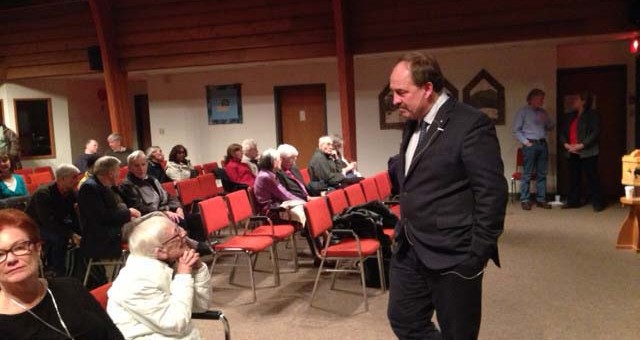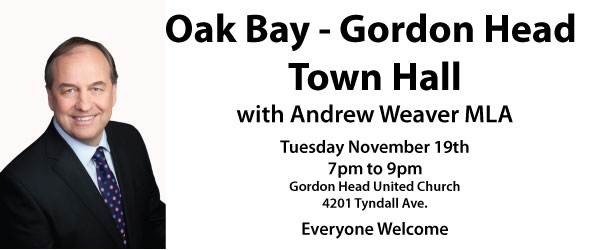Community Blog
Holiday Open House
Everyone is welcome to our Holiday Open House, an opportunity to meet with Andrew Weaver, staff and volunteers.
When: Monday December 16th, 4pm to 6pm
Where: Constituency Office – #219 3930 Shelbourne St.
Canned goods and non-perishable food items appreciated for donations to the food bank.
Be a Santa to a Senior
Today I had the honour of cutting the ribbon to open the Home Instead Senior Care’s Resource Centre annual Be a Santa to a Senior initiative.
- Forbes pharmacy Goldstream
111-755 Goldstream Ave - Home Instead Senior Care
1595 McKenzie Ave Suite 222 - Progressive Chiropractic
1595 McKenzie Ave Suite 207 - Walmart Uptown Centre
3440 Saanich Road - WalMart, West Shore Town Centre
West Shore Town Centre, 860 Langford Parkway
Below is the text of my speech today:
Thank you very much for the invitation to come here today.
What a fantastic way to give back to the community and bring joy to our seniors who are less fortunate and need our support! The Be a Santa to a Senior is already a very successful program throughout North America, with 60,000 volunteers and retail partners who have provided 1.2 million gifts to 700,000 seniors.
Thank you to Victoria Home Instead Senior Care for supporting the Be a Santa to a Senior program in our community – you’ve already made a huge difference in the lives of 1,170 seniors in Victoria thanks to the time and energy given by many people – Volunteers, Social Workers, Outreach and Care Workers – working in partnership with local businesses to make this happen.
Congratulations on your success.
It is heartwarming to know so much care and kind attention goes to our vulnerable seniors, especially at this time of year.
As your MLA, I am committed to advocate on behalf of our seniors so they have access to the services that they so richly deserve. The seniors I have spoken to are quick to point out that they want to live independently as long as possible, with timely access to needed services and social programs. I’d like to see our communities provide more ways for our seniors to remain independent, living safely and comfortably, with needed services close at hand.
Since being elected, I’ve had many meetings with seniors in our community, as well as with staff from agencies involved in the delivery of a variety of seniors’ services. My staff and I are working hard as we develop an understanding of some of the key issues affecting our community. We plan to create more opportunities for dialogue with seniors in the months ahead– to hear their concerns and receive their input and advice and learn from their wisdom.
And in particular, it’s clear that there’s a strong desire to have a one-stop shopping senior’s health care centre in our riding modeled after the previously successful Hillside Senior’s Health Care Centre next to Aberdeen Hospital.
I’ve always believed that one should treat others the way you would like others to treat you. The same goes for our seniors. As a society, we should treat our present generation of seniors with the same dignity and respect as we would like to be treated when we become seniors ourselves.
Thank you again for the invitation to attend today’s event and thank you for the tremendous support you give to our senior citizens who benefit so much for the kindness you show them.
Have a wonderful holiday season. May Santa in turn bring you the presents you so richly deserve for organizing Be a Santa to a Senior in our community.
Andrew Weaver
A Vision for Social and Economic Policy
BoardVoice is dedicated to improving social services to people in their communities. We do this by speaking to government and to our communities about the importance of social services to the health and well being of our citizens, bringing to their attention key concerns and issues, and telling the good news about the work of community based social service agencies.
We promote excellence in governance by connecting board members from across the province and providing resources that assist in developing their boards.
We help build bridges between agencies at the community level to ensure community-wide understanding of how best services should be organized and delivered. Board Voice.ca
On Friday November 22nd, at the Board Voice conference in Vancouver BC, Andrew Weaver, MLA for Oak Bay – Gordon Head provided his thoughts in a keynote speech to delegates.
Board Voice Conference Speech
“We live in a province of opportunity. Not opportunity that is handed to us, but opportunity that we create. We live in an time where the challenges of today are no longer addressed by the solutions of yesterday, and so we are called upon to find new solutions to new challenges—to create new opportunities—so that together we can continue to build a more prosperous, equitable and just society.
We have heard the Liberal government talk of a generational opportunity to develop a liquefied natural gas sector in BC. Today, I would like to propose that we have another generational opportunity in front of us; a generational opportunity to rethink how we address the social challenges that for years have afflicted British Columbians—our families, friends, neighbours, and ourselves.
To do so, we must start by recognizing the reality around us. We are working in a context of budget cuts and core reviews, growing social issues and an economy that is still bouncing back from the 2008 recession. It is a context of limited resources and significant challenges where we do not have the luxury or the resources to address social, environmental or economic issues as if they are isolated siloes — each independent from the other. We have tried this for years, and it does not work.
Addressing these issues in a context of limited resources requires us to move beyond the traditional framework that a social issue is social, and an economic issue is economic.
Instead we are required to find those nexus points that wed the economic, the social and the environmental into a coherent and comprehensive framework for developing our society. Developing these nexus points requires the political will to steer our society in that direction. And that is what I would like to talk to you about today: Nexus points and political will.
What do I mean by this?
Tomorrow morning, you’ll be hearing more about what Alberta’s Social Policy Framework entails and how the Government of Alberta developed this framework. Board Voice is advocating for a similar social policy framework for BC. I believe this is an idea that has merit and deserves attention. But I would challenge us to take it one step further.
As you all know, our ability to fund and implement a social policy framework is contingent on a strong economy that provides the resources to do so. In turn, building a strong economy is contingent on addressing social issues and on the sustainable management of our environment and the resources it affords to us.
There are countless examples of where our attempts to develop the economy have caused significant social or environmental challenges, and vice versa. We need to build a framework that does not simply address social issues alongside the economic development plan, but one that integrates social issues into, and weds them with, economic development and the sustainable management of the environment.
We need to find the nexus points that allow us to move all three aspects forward for the benefit of British Columbia. These nexus points exist, but finding and developing them requires the political will to do so, and therein lies a significant challenge.
How do we create the political will to not simply take the easy way out and focus solely on a single issue, like the economy, but instead to explore those nexus points between the economy, social issues and the environment? This is where, I believe, the Albertan example can offer some guidance.
In creating their social policy framework, the government of Alberta reached out to over 31,000 Albertans in order to get their feedback. This process offered Albertans the opportunity to define Alberta’s social priorities and values in a comprehensive, holistic, and inclusive manner.
As an example, let me highlight two of the social policy goals that were identified as a priority in the framework:
(1) protect the vulnerable, and (2) reduce inequality.
These are goals derived from the people of Alberta, not the government of Alberta, nor Alberta’s governing party. And they are goals that are now being addressed as a part of a comprehensive social policy framework, because Albertans had the opportunity to raise their priorities thereby generating a social license and building political will.
The large-scale public consultation was a critical aspect of creating a social license and building political will. We could and should do the same in British Columbia.
I believe the rationale for having such a framework also exists in British Columbia. In particular let me draw your attention to the three central reasons for the implementation of Alberta’s Social Policy. Paraphrasing, they were:
(1) to clarify the priorities and goals of Albertans and how roles and responsibilities should be allocated,
(2) to coordinate and harmonize activities between government divisions and also with other stakeholders while also ensuring that there is policy alignment and consistency, and
(3) to provide overall direction and focus to planning and decision-making.
To be sure, the Albertan example is not perfect. There was criticism of both the public consultation and the framework itself and the Albertan context is quite different from the British Columbian context. But nonetheless, let’s consider these goals in the context of British Columbia and let’s do that through the lens of a specific issue: adolescent mental health care.
We have a chronically underfunded adolescent mental health care system. In fact, the Representative of Children and Youth does not even consider it a system, so much as a patchwork of services. These services are primarily offered by two ministries: the Ministry of Children and Family Development and the Ministry of Health.
The problem is, because they are offered by two ministries with insufficient coordination of care, many young people experiencing mental health issues, and their families, struggle to navigate the services and find the support they need. Effective coordination and harmonization of services is lacking and that reality is having a negative impact on our ability to deal with adolescent mental health problems.
This situation has both social and economic consequences. Socially, it means that many people in need of care are not getting the care they deserve. The significant distress and impact this lack of care has on the individual is impossible to put a number to, but sadly we all know from recent cases, just how far it can go.
Economically, mental health problems and illness are estimated to cost our province more than $6 billion each year through service costs and lost productivity. This amount does not include costs related to the criminal justice, education or child welfare systems. The longer we put off effectively treating mental health care issues, the more we suffer the long-term economic consequences of our inaction. Better coordination and harmonization of services—through a comprehensive framework—could allow for more effective allocation of public resources, making economic sense, and for more effective treatment, making social sense.
Taking this further, right now the Liberal government is administering what they call a core review. Their goal is to use public resources more efficiently by eliminating unnecessary spending. Yet issues such as better coordination and harmonization of services and long-term planning that would see the better treatment of mental health as both a smart social, and a smart economical, choice are not being fully considered.
They are not being fully considered, in part, because we see mental health as a social issue—one that is secondary to the government’s primary economic agenda. We have siloed mental health into the social realm and have failed to see that, in its essence, adolescent mental health is also an economic issue and that developing a strong economy also requires that we address what we have traditionally seen to be simply social challenges.
We need to change that. We need to build the political will for a triple-bottom-line understanding of these issues—one that looks for those nexus points and uses them to move our province forward.
Although it remains to be seen how effective the Alberta example will be, I do think there is value to considering their approach. In fact, I believe the public consultation process that Alberta ran could also serve British Columbia as we consider our own framework. It could help us define for our own government, what our priorities as citizens are and what their priorities as a government should be.
Yet, I would challenge us all to see this not simply as an opportunity to address the social challenges of our time, but also as an opportunity to create a more holistic vision for British Columbia, generated by the people of this province, and predicated on triple-bottom line priorities and finding key nexus points of interaction.
Addressing social issues, building a strong economy, and sustainably managing our environmental resources—these are significant and interconnected societal challenges that must be dealt with as such. And creating the political will to see these issues as interconnected and address them in that way is our challenge.
I believe meeting this challenge will require us to transcend partisan politics and go to the root of what matters to British Columbians. An independent, public consultation offers us the opportunity to accurately reflect the true values and priorities of British Columbians without the interference of partisan politics. And it ultimately builds the social license required to implement the resulting policies.
Thank you very much for your time and for affording me the opportunity to speak.”
Andrew Weaver – MLA for Oak Bay – Gordon Head
Island Health Wants to Hear from You
Are you concerned about the future of health care on Vancouver Island?
Do you or someone you know have suggestions about how to improve our health care system?
Island Health (formerly the Vancouver Island Health Authority—VIHA) has launched a public consultation process to help shape its new strategic plan, Island Health 2018—and they are asking for your feedback.
The new strategic plan will lay out how Island Health will:
- Improve health for Islanders through community partnerships and health promotion
- Create a culture of excellence, quality and safety for clients, patients and health care workers
- Engage communities, clients and our workforce more effectively
- Sustain our health and care system through sound fiscal management
Island Health will be holding a public consultation session in Victoria this month. Here are the details:
Date: Tuesday, Nov. 26, 2013
Time: 5:30-7:30pm
Location: Sandman Inn, 2852 Douglas Street, Victoria, B.C.
Town Hall with Andrew Weaver MLA
I’m excited to announce that we’ve scheduled our first public Town Hall from 7pm to 9pm on November 19th at Gordon Head United Church (4201 Tyndall Avenue).
On November 19th, I will give a presentation entitled “The Clean Energy Challenge in British Columbia”. This will be followed by a session where your questions and issues are brought forward from the floor. It would be my pleasure to offer an update on local issues, including Oak Bay Lodge, Ledger House and many more, that my team and I have been working on during these past few months. Although there has not been a fall sitting of the Legislature, we’ve been busy on many projects.
Please come and join me for what I hope will be an interesting and informative evening.
Best wishes
Andrew Weaver
MLA Oak Bay Gordon Head
PS If seating becomes limited, first priority will go to constituents from the Oak Bay Gordon Head riding.












